A Welsh expat has shared the benefits and drawbacks of remote living after moving to an uninhabited island near New Zealand.
Catrin, a 22-year-old outdoor instructor, has worked in far-flung destinations all over the globe, from Borneo to India, and regularly documents her experiences, itineraries, advice, tips and tricks on her travel blog.
In 2023, Catrin left her job in Malvern, England, and relocated to Motutapu Island, situated in the Hauraki Gulf to the northeast of Auckland, New Zealand, where she spent nine months working in an outdoor recreation centre.
Taking to her blog in August of that year, she highlighted the pros and cons of living in a secluded location.
Though the island boasts rolling hills, farmland, beaches, walking trails and scenic views, it has been uninhabited for over 700 years and is only accessible either by ferry from Auckland or via a causeway from Rangitoto Island.
Catrin warned: ‘Living remotely can come with both positive and negative aspects, and remote work is not for everyone.’
Read on to discover what everyday living is truly like on Motutapu Island:
Pros

Catrin, a 22-year-old outdoor instructor, left her job in Malvern, England, and relocated to Motutapu Island, situated near Auckland, New Zealand, where she spent nine months working in an outdoor recreation centre
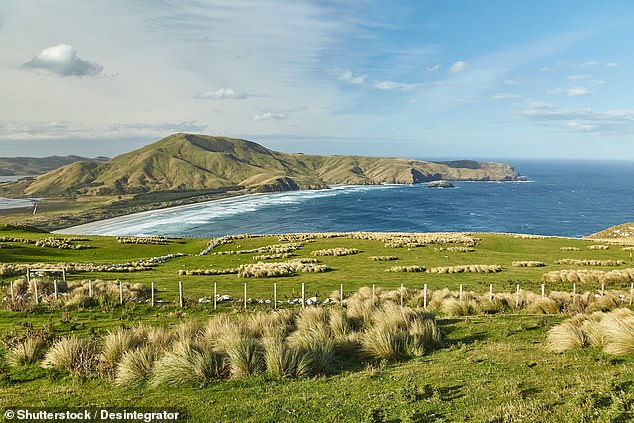
Though the island boasts rolling hills, farmland, beaches, walking trails and scenic views, it has been uninhabited for over 700 years and is only accessible either by ferry from Auckland
Peacefulness
According to Catrin, an uninhabited island provides the perfect base for a peaceful existence without the everyday interference of urban life – giving individuals the space to think, relax and unwind.
Catrin wrote: ‘The only noise you’ll hopefully be complaining about is the wake up call from the tweeting of birds at early hours in the morning, or the sound of the river and sea if you desperately need the toilet!’
Stargazing
Although not designated as an official Dark Sky Reserve, Motutapu’s natural, undisturbed environment and relatively dark skies – especially away from the main camping areas – offer good incredible opportunities for stargazing on clear nights.
Catrin added: ‘If you love your stargazing and astrology, then working in a remote location would be super cool!’
Scenery
Motutapu Island offers a diverse and scenic landscape, with a blend of rolling farmland, native bush, and historical sites.
It’s known for its tranquil environment, offering walking tracks, coastal views, and opportunities to explore both Maori and World War II history.
Catrin wrote: ‘As I’m living on an island with sun and beaches, I have amazing views of the city in the distance, other islands, the sea, and the rolling green hills. Oh, and also the volcano adjacent to the island I’m on!’
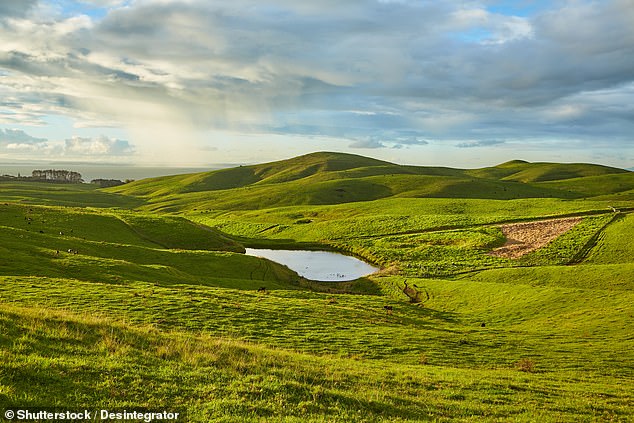
Motutapu Island offers a diverse and scenic landscape, with a blend of rolling farmland, native bush, and historical sites
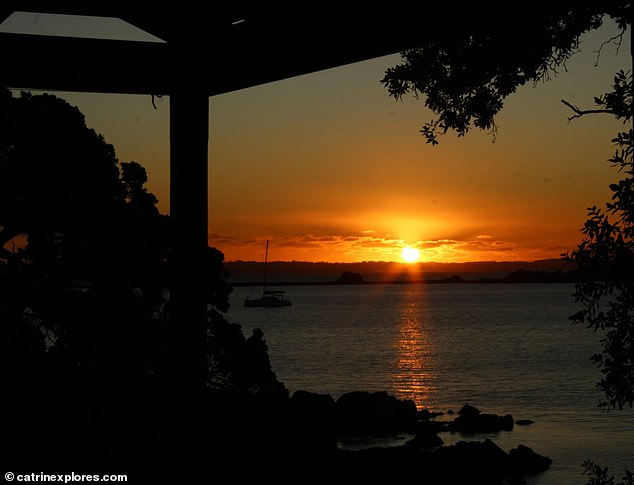
It’s known for its tranquil environment, offering walking tracks, coastal views, and opportunities to explore both Maori and World War II history (Pictured: Catrin’s photo of a sunset on Motutapu Island)
Safety
Motutapu Island is considered safe to Catrin, despite its secluded nature.
She noted that, as a young female, she was the ‘safest she ever felt’ while living on the island.
The outdoor instructor added: ‘Not once have I stressed about going out after dark, about leaving the doors open, about being paranoid that something’s going to happen. Just one less thing that’s on my mind when going to sleep.’
Regardless, visitors should be prepared and aware of potential risks, as the island lacks many typical amenities and services, requiring visitors to be self-sufficient and mindful of their surroundings.
Introvert’s paradise
According to Catrin, working in a remote location ties in perfectly with individuals who identify with being introverted.
She said: ‘As you will most likely be in a location away from any sort of civilisation, it will make it a lot more difficult to socialise with large range of people. Saying this, it will allow you to get close to a small group, and you can make friends for life!
‘If you enjoy spending some time on your own, or with a small, steady bunch of people then this is an ideal situation for you to find yourself in.’
Money saver
When living on a remote island, everyday living is likely to be less costly as there are a lack of extracurricular activities and amenities to actually spend money on.
Catrin explained: ‘No high streets, shops, cinemas or pubs to spend all my money, which makes it a great place to start saving for upcoming trips.’
Cons
Accessibility
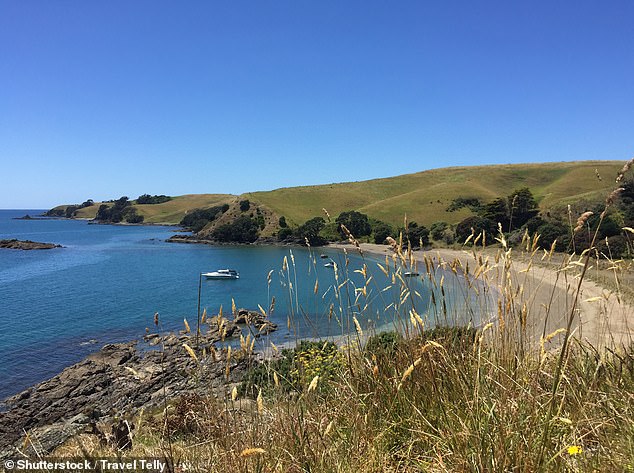
There is no public transport available on the island, and visitors must rely on ferries, private boats, or kayaks for access, with the public ferry service from Auckland to Motutapu limited to just one departure a week
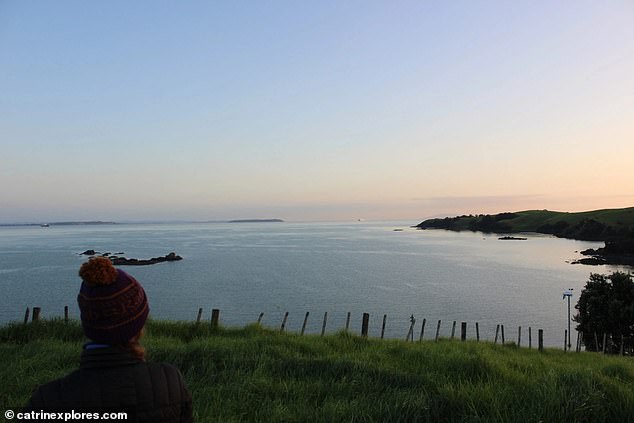
According to Catrin (pictured, in her own photograph), visitors and residents would simply have to ‘make do’ with living a slower life, such as immersing themselves in nature or hanging out with other individuals on the island
Despite its beauty and historical significance, Motutapu Island has some accessibility limitations, such as a lack of public transport and a limited ferry service.
There is no public transport available on the island, and visitors must rely on ferries, private boats, or kayaks for access, with the public ferry service from Auckland to Motutapu limited to just one departure a week.
Visitors have to travel elsewhere for food and water as there are no readily available sources on the island, except for Home Bay.
Catrin said: ‘This can be a challenge. Luckily for us, there is a regular ferry, and easily accessible water taxis to and from mainland.
‘Just do some research before you choose to accept a remote position, for accessibility to amenities and the frequency of being able to get things.’
Facilities and amenities
According to Catrin, visitors and residents would simply have to ‘make do’ with living a slower life, such as immersing themselves in nature or hanging out with other individuals on the island.
She warned: ‘If you are unable to do that, then remote location work is definitely not for you! It requires an ability to be productive and find activities out of minimal things, rather than staying inside.’
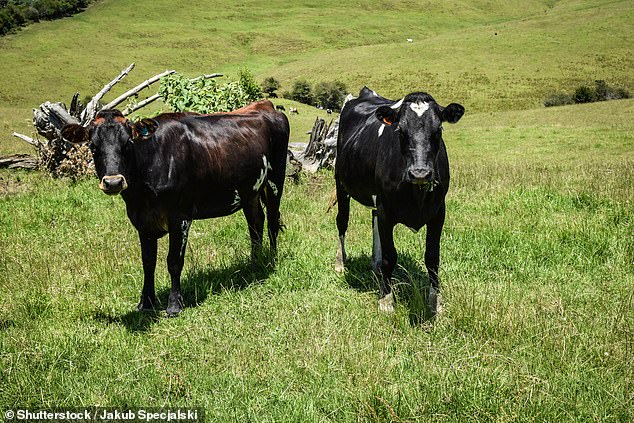
Catrin warned that spending long, extended periods living on a remote island can be ‘very challenging,’ and can even affect a person’s mental health
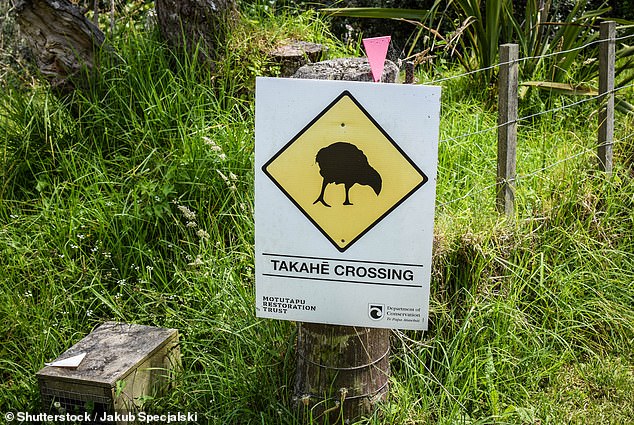
Pictured: Rangitoto and Motutapu Islands in New Zealand
Social opportunities
The outdoor instructor warned that some people may experience difficulty in moving to the island at first as there will only be a select number of people to get to know, and a ‘people-person’ personality is required to get along with neighbours.
She added: ‘It’s going to be a long, difficult time if people don’t get along with you, or you don’t get along with others! You must be adaptable, and be able to be civil and friendly, even with those who you don’t quite see eye-to-eye with.’
Freedom
The biggest drawback for Catrin is the ‘lack of freedom’ on the island, as she was unable to ‘pop to the shops’ or head out to dinner and drinks with friends.
She warned that spending long, extended periods living on a remote island can be ‘very challenging,’ and can even affect a person’s mental health.
Catrin added: ‘You start to become stir crazy, being stuck in the same location, with the same scenery, and the same people.
‘You can’t find somewhere to decompress, somewhere to get away from everything happening at work/home life. It can become very difficult.’












